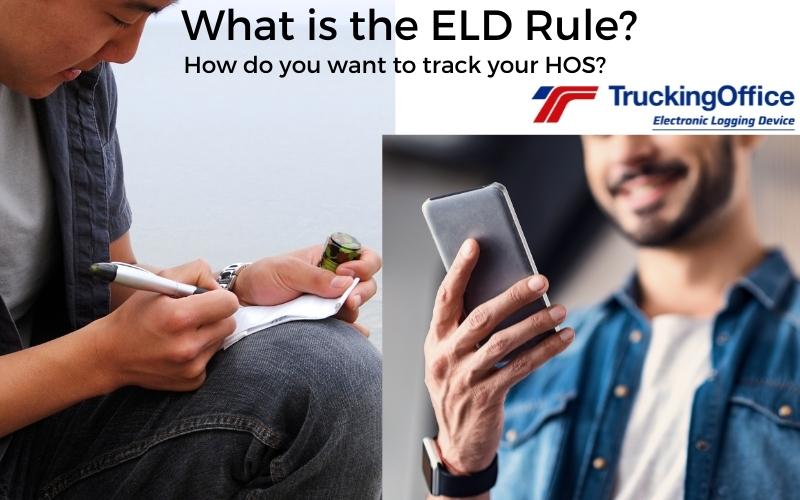As a commercial motor carrier driver or owner-operator you’ll be asking many questions. So, to help you sort through the maze of information, we’ll talk about your biggest question, what is the ELD rule? The ELD mandate is a federal government regulation that requires motor carriers and drivers to record all aspects of their hours-of-service (HOS).
As you know, the FMCSA works with the Department of Transportation (DOT) to help reduce the number of roadway accidents in the US. ELDs or electronic logging devices are an essential aspect of their initiative. FMCSA now requires them to help improve highway safety. However, one of the stipulations among ELD standards is that drivers must limit the number of hours they drive in a day. In this way, accidents caused by driver fatigue will decrease. FMCSA now requires them to help improve highway safety
What Information is Gathered by an ELD?
Drivers worry that the new system will negatively affect their profits. But, the ELD mandate can actually benefit drivers in many ways. It records
- dates
- times
- locations
- engine hours
- miles
- driver identification information
as well as providing accurate records that are required by IFTA, IRP, and DOT, among others.
ELDs also gather real-time information that can be used to help manage and improve business. This also includes tracking time spent loading or unloading or other delays an ELD can reveal where or why time is wasted. This can be a valuable tool for drivers. As well as owner/operators, or fleet managers. Here are a few other ways an ELD assists in implementing operational improvements:
- Measures fuel consumption to track each vehicle’s performance.
- Daily trip reports chart driving time and idle time by vehicle or driver.
- HOS information helps dispatchers make better decisions regarding potential next loads.
- Monitoring driver behavior can help predict the likelihood of an accident.
These are just a few of the many benefits of having an ELD on board. They also reduce paperwork and limit human errors to help the business run more efficiently.
Who Needs to Install an ELD?
The ELD mandate applies to most commercial drivers. This amounts to about 3.5 million CMV drivers nationwide. A driver who maintains record-of-duty status (RODS) is required to be ELD compliant.
It will be difficult to know if your ELD is up-to-date with all the technical requirements. You may not realize that it’s not compliant until a field agent shows up to conduct a review.
The FMCSA doesn’t vet ELD devices. Therefore, they have determined that those that rely on cellular networks are not dependable. For this reason, devices that rely on Bluetooth or a USB connection are recommended.
Are There Exemptions to the ELD Mandate?
Under specific conditions, drivers may be exempt from the ELD rule. According to the FMCSA fact sheet, some of those exceptions include the following:
- Short-haul drivers who are not required to keep RODs.
- Drive-away-tow-away operations where the vehicle being driven is a commodity being delivered.
- Drivers using paper RODS for no more than 8 days out of 30.
- Drivers who operate vehicles manufactured before 2000.
What Is ELD?
Now that you know all about the ELD mandate, you need to know: what is an ELD? An ELD is an electronic logging device. Commercial vehicle drivers are required to use the devices to automatically record driver activity including HOS and RODs. The device collects data on the vehicle’s engine, miles driven, and movement. Drivers, fleet managers, and dispatchers can use this real-time information to help with load planning and routing.
ELD technology includes a device that connects to the engine and offers features such as fleet management software and a mobile app. Of course, different brands of ELDs offer different features, so you should choose the product that best serves your needs. The FMCSA provides a list of manufacturers that meet their ELD standards for the devices.
Another benefit you’ll appreciate, whether you are an owner/operator or the manager of a large fleet, the company interface can record data for all vehicles, including all DOT records.
So, if you’re dissatisfied with your current or ELD or are in the market for your first one, use the free trial we offer to learn about our TruckingOffice ELD. You’ll find that our device is easy to install and use, plus it can be integrated with our TMS for all your record-keeping needs.
Does TruckingOffice TMS Work with ELDs?
Without a doubt, some trucking management software (TMS) programs won’t provide the functions you need for operating a successful business. Fortunately, there’s TruckingOffice. Our experts developed a user interface that allows our TMS system to gather HOS data from the ELD. In this way, drivers and dispatchers have real-time information to help them get organized and stay on top of load distribution.
Learn more about our TruckingOffice program by signing up for your free trial.







Recent Comments